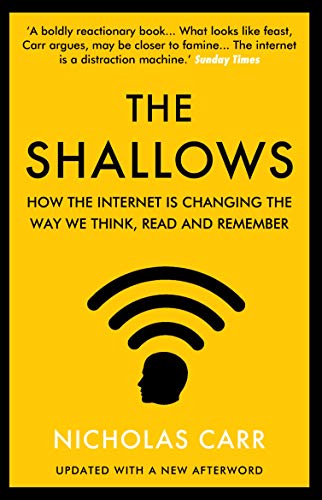Just finished the book that’s often called a deeper, and a more philosophical version of the popular book Deep Work by Cal Newport.

The Shallows by Nicholas Carr explores what the Internet is doing to our brains. Even though the book was written in 2010, it’s eerily accurate about what most of us have come to feel about the effects of the Internet and social media.
The most significant point the book drives home is that while the Internet makes us feel smarter, it is actually making us dumber. This apparent paradox is resolved when you get to the neuroscience of how our brain processes information.
Psychologists have discovered that our brains are suckers for information that is: a) new or novel; b) personally relevant; c) potentially rewarding; d) emotionally engaging. We’re evolved to get hooked to information that has these attributes because it helped with our survival back in the days when information was scarce. But, today, information is anything but scarce. In fact, social media apps like Instagram optimize for the very same attributes, creating 24/7 attention drains for us to get lost into.
Attention is necessary not just for deep thinking, but for empathy and compassion too. You cannot be a human without being able to give sustained attention to what you consider as important. But, instead of developing deeper as a person, with our attention withering away, we’re becoming mere conduits of time. The infinite timeline gives us an impression of grasping information because what we see is often interesting, but the constant bombardment of stimulation ensures we remember nothing from it.
What do you remember from your Instagram or Twitter timeline from a week back?
Nothing, right?
You cannot possibly remember anything from your timeline because the Internet is not designed to help you digest information. Our brains require a sustained amount of attention to transfer whatever is in the short-term working memory into the long-term memory. On social media with one shiny new thing per second, our working memory is never stable enough to consolidate memory and form rich concepts in the mind.
Why is memory important, you’d ask?
Because we’re nothing but a collection of our memories. Creating something original requires a memory of culture. Production of knowledge requires a memory of existing knowledge. Standing up to injustices requires a memory of history. When we prevent the formation of memories, we prevent the development of our humanity.
The book quotes heavily from McLuhan’s Understanding Media, in which he emphasizes that media shapes the content. TV didn’t merely add visuals to radio. It led to entirely new forms of content. The Internet didn’t merely digitize newspapers. It changed the very idea of news. Social media isn’t merely our social interactions done online – it’s changing what we even mean by social relationships.
As we shape our tools, they shape us back. The invention of clocks made us measure time and hence pay attention to the economic value of our time. Similarly, Google made us forget all the facts we used to remember, GPS made us forget routes, and the smartphone made us forget all the phone numbers.
Some would argue that this is a good thing – why do something we can have technology do it for us? Yes, that’s true, but then we need to reflect deeply within ourselves and think of the endgame. Who will we be if we end up delegating all of our faculties to technology? Empty shells, I suppose.
As we offload our brains to technology, we’re not creating any extra space in the brain for doing great things. The brain isn’t like a computer with finite space. Sure, our working memory is limited, but the capacity to store memories and form rich concepts is almost limitless.
The London cab drivers are (were?) required to remember all the city’s routes. But when they use GPS and gradually forget the routes, it’s not like they become better at something else like chess or painting. The once impressive ability to navigate London’s streets is simply lost. And with that loss, even though navigation still happens thanks to technology, the human brain becomes a little dumber.
What’s the solution for this? How do we prevent ourselves from becoming unthinking automatons?
The book doesn’t offer any remedy to reclaiming our attention. I suspect that’s because it’s well-nigh impossible. How many of us have deleted our social media accounts in disgust, only to find ourselves back within a few days? Getting off the Internet today is simply impossible. Even if you’re living like a hermit, the society will find a way to suck you back into the web.
There’s no going back to the pre-Internet days of deep reading, day-dreams and genuine social connections at dinner tables. But, we can still aim to be controlling what we want from technology, instead of being mere tools for its expansion. After all, only those who don’t get suckered in to other people’s creations can create themselves.
Join 150k+ followers
Follow @paraschopra